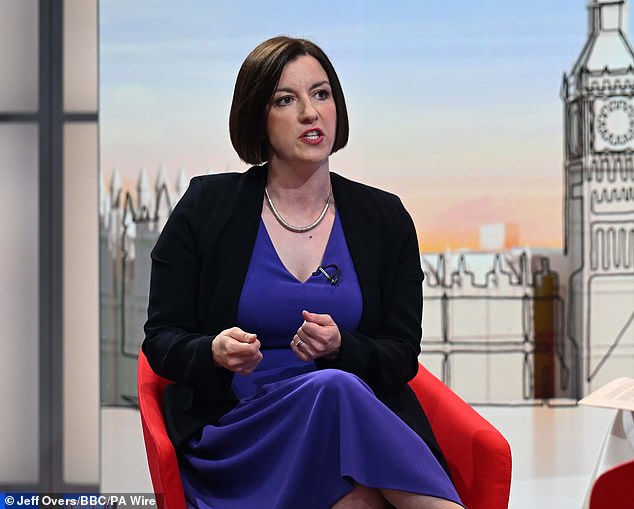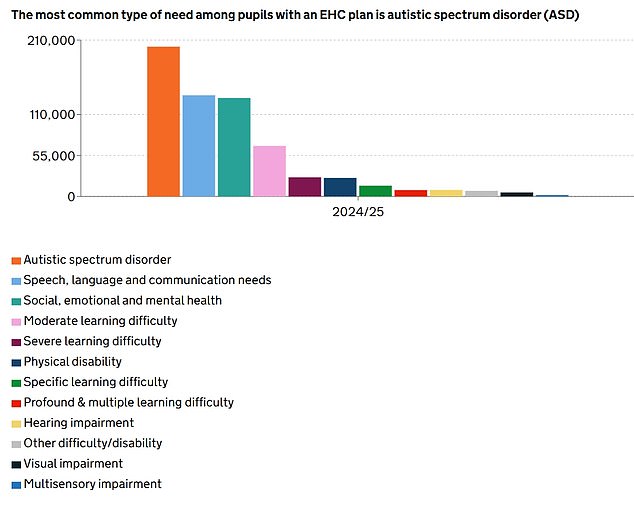Keir Starmer is facing another huge Labour revolt as the government struggles to get a grip on special needs funding.
MPs and campaigners are gearing up for a confrontation with ministers on a new front after Keir Starmer was forced into an humiliating climbdown on welfare reforms last week.
Battle lines emerged when Bridget Phillipson refused to commit to keeping Education, Health and Care Plans (EHCPs) in an interview yesterday.
Holding an EHCP gives a child the legal right to a specific package of support, including one-to-one assistance, specialist equipment and dedicated speech and language therapy.
However, there has been an alarming increase in the number of children with a care plan from 240,000 a decade ago to 638,000.
There were almost 98,000 new EHCPs issued in 2024, a 16 per cent rise on the previous year’s figure. The most common type of need for those with a plan is autistic spectrum disorder.

Battle lines emerged when Bridget Phillipson refused to commit to keeping Education, Health and Care Plans (EHCPs) in an interview yesterday
A report by the National Audit Office last year warned that the system was ‘financially unsustainable’ and risked forcing councils into bankruptcy. A ‘statutory override’ that effectively allows local authorities to ignore funding shortfalls is due to expire next March.
The IFS think-tank highlighted in December that central government funding for high needs had reached £11billion a year, up 59 per cent in real terms since 2015–16.
That accounted for half of the total real-terms rise in school funding over the same period.
Just over £1.5billion was earmarked for transporting SEN pupils aged up to 16 in 2024-25. That was up from £1.2billion the previous year – and around three times the level from 2017-18.
The overall schools budget in England was around £64billion last year.
Ms Phillipson yesterday said that a review due in the autumn would ensure children would get the ‘support maintained that they need’.
But she repeatedly dodged on whether they would retain the legal right to extra help guaranteed by the EHCP system.
She told the BBC the situation was ‘tough’ and suggested that more children may have to have their needs met through mainstream education.
She said the current system was ‘too adversarial, it takes too long, it’s too bureaucratic’.
‘I do think we need to just take a step back and think about how do we build a better system that is more timely, more effective and actually maximises support including for children with complex needs,’ Ms Phillipson said.
Options thought to be under consideration including phasing out EHCPs or restricting them to children with the most profound needs.
However, one Labour MP told the Guardian: ‘This could be a massive problem. We are hoping there will be proper engagement around it, but we are worried about some of the signals we are picking up.’
Another said: ‘People are really, really worried about this. It is one of the things that is going to make people feel very, very uncomfortable.’
A letter to the paper signed by dozens of campaigners – including Jane Asher, the actor and president of the National Autistic Society – said EHCPs must be kept to avoid thousands of children being ‘denied vital provision, or losing access to education altogether’.

The most common type of need for those with an EHC plan is autistic spectrum disorder, DfE said
Education minister Stephen Morgan tried to cool concerns this morning as he toured broadcast studios.
Asked if parents could be reassured about the government’s plans, he said: ‘Absolutely. What we want to do is make sure we’ve got a better system in place as a result of the reform that we’re doing that improves outcomes for children with additional needs.’
Pressed if the reforms could including scrapping ECHPs, Mr Morgan replied: ‘We’re looking at all things in the round.
‘I’m not going to get into the mechanics today, but this is about strengthening support for system.’












